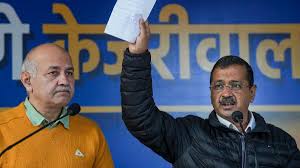NEW DELHI: The Union Home Ministry has granted sanction to the Enforcement Directorate to prosecute former Delhi chief minister and AAP national convener Arvind Kejriwal in the excise policy linked money laundering case, officials said.
The Centre has also given its node to prosecute former Delhi deputy chief minister and senior AAP leader Manish Sisodia in the case.
Last month, Delhi Lieutenant Governor V K Saxena recommended the ED’s request to the Centre to prosecute Kejriwal, which enraged AAP. The party had termed Kejriwal’s arrest by CBI and ED completely “unauthorised and illegal”.
The federal agency has filed a chargesheet against Kejriwal before a special Prevention of Money Laundering Act (PMLA) court here last year after arresting him in March.
The Ministry of Home Affairs (MHA) has recently granted the required sanction to the Enforcement Directorate (ED) for prosecuting the 56-year-old politician under the anti-money laundering law in the Delhi excise policy case, officials said.
The development comes ahead of the Delhi Assembly polls on February 5.
Kejriwal has been made an accused in his personal capacity as well as in the capacity of being the national convener of his political party AAP.
The former chief minister was called the “kingpin and key conspirator” of the Delhi excise “scam” by the ED.
It was alleged that he acted in collusion with Delhi government minister, the AAP leaders and others.
The ED had earlier claimed that AAP, being a political party, is defined as an association or a body of individual citizens of India under the Representation of the People Act and hence it can be categorised as a “company” as contemplated under Section 70 of the PMLA.
As Kejriwal was “in-charge of and responsible” for the said company i.e. AAP during the time of offence, he and his party “shall be deemed guilty” of offences mentioned under the anti-money laundering law and liable to be prosecuted and punished, it had said.
The excise case pertains to alleged corruption and money laundering in formulating and executing the Delhi government’s excise policy for 2021-22, which was later scrapped.
Delhi Lieutenant Governor V K Saxena had recommended a CBI probe into the alleged irregularities. Subsequently, the ED registered a case under the PMLA.
Taking cognisance of a CBI FIR lodged on August 17, 2022, the ED filed its money laundering case on August 22, 2022 to probe the alleged irregularities.
On November 20, Kejriwal had approached the Delhi High Court seeking to quash a local court’s July 9 order, taking cognizance of the 200-page charge sheet filed by the ED.
Kejriwal challenged the trial court’s order on grounds of lack of sanction to prosecute him and subsequently sought a pause on the trial court proceedings in the money laundering case.
The AAP leader’s plea came in the wake of November 6 apex court’s ruling that requirement for prior government sanction to prosecute public servants, as mandated under the CrPC, also applies to complaints involving money laundering cases.
The SC order came on ED’s petition challenging the HC decision quashing an order of the trial court that had taken cognisance of the ED’s prosecution complaint on money laundering charges against Andhra Pradesh’s senior bureaucrats Bibhu Prasad Acharya and Adityanath Das.
The ED had contended that considering the object of the PMLA, the requirement of obtaining a sanction under Section 197(1) of CrPC will be inconsistent with Section 71 of the PMLA.
According to ED sources, before SC’s ruling it was not mandatory for them to take sanction for prosecution.
In the latest prosecution sanction document, accessed by The Tribune, the ED mentions that Supreme Court had, in the case of ED vs Bibhu Prasad Acharya & others clarified, that the Provision of CrPC applied to Section 65 of the PMLA and Section 71(1) “cannot override the provision of CrPC which applies to the PMLA” vide its judgment dated November 6.
“In view of the above fact and circumstances, Sanction may be required for prosecution to Arvind Kejriwal, former CM, Govt. of NCT of Delhi, for offence of Money Laundering under Section 4 of PMLA…” the sanction added.
On the official document, the vigilance department had also made observations, stating that they found the matter “grave in nature” and directed a proposal be submitted to L-G for his recommendations before referring it to MHA.


